宾语补足语Word版
(完整版)英语宾语补足语用法详解
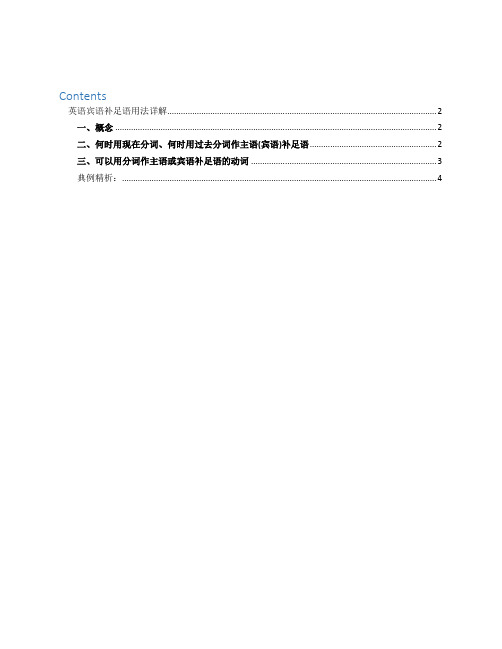
Contents英语宾语补足语用法详解 (2)一、概念 (2)二、何时用现在分词、何时用过去分词作主语(宾语)补足语 (2)三、可以用分词作主语或宾语补足语的动词 (3)典例精析: (4)英语宾语补足语用法详解一、概念分词作主语补足语和宾语补足语其实是同一成分用于两种不同的句式中。
具体地说,主动态句子中的宾语补足语就是被动态句子中的主语补足语。
先了解宾语补足语,则很容易了解主语补足语。
宾语补足语:在英语中,某些及物动词不仅需要宾语,而且还要求某个词或词组来补充说明宾语,即表示宾语代表的人或物所发出的动作或所处的状态,这个词或短语称为宾语补足语。
有些语法书把宾语和补足语称为复合宾语。
句型:及物动词+宾语(n./pron.)+宾语补足语(n./adj./adv./to do/-ing/-ed/介词短语共7种表示法)该句型若变成被动语态,即将宾语提到句首作主语,原主动语态中的宾语补足语此时在被动语态中起到补充说明主语的作用,所以改称主语补足语。
例如:A cook will be immediately fired if he is found smoking in the kitchen.此句中smoking是主语he的补足语,所以称为主语补足语。
二、何时用现在分词、何时用过去分词作主语(宾语)补足语分词作主语(宾语)补足语时,若主语(宾语)与分词之间是主动关系,则用现在分词表示主动;如果主语(宾语)与分词之间是被动关系,则用过去分词表示被动。
例如:He was heard singing in the next room.He was singing.主语he与补足语“唱歌”之间是主动关系,故用现在分词singing。
One of the glasses was found broken.One of the glasses was broken.主语one of the glasses与补足语“打破”之间是被动关系,故用过去分词broken。
中的宾语补足语

中的宾语补足语宾语补足语是使及物动词的宾语更加完整,更加具体的一种语法成分。
它可以是名词、形容词、副词、介词短语等,用来补充说明宾语的性质、状态、方向等。
下面将从名词、形容词、副词以及介词短语这四个方面探讨中的宾语补足语的用法和特点。
名词作宾语补足语:名词作宾语补足语常见于表示感观、认识、思考等抽象动作的动词后面,如看见、觉得、认为等。
名词作宾语补足语时,可以是抽象名词、具体名词等不同类型的名词。
例句:我觉得他是个勤奋的学生。
她认为那幅画是艺术品。
他们发现这个项目是一个巨大的机遇。
形容词作宾语补足语:形容词作宾语补足语通常出现在及物动词的宾语后面,用来补充说明宾语的性质、状态等。
形容词作宾语补足语时,可以描述宾语的特征、品质、状态等。
例句:她把房间打扫得很干净。
他把问题解释得很清楚。
他们弄得床铺整整齐齐。
副词作宾语补足语:副词作为宾语补足语,通常出现在及物动词的宾语后面,用来修饰宾语的动作或状态。
副词可以增添对宾语的程度、方式、方向等方面的说明。
例句:他吃完饭后就去上班了。
她努力地学了一整天。
他们慢慢地走进了教室。
介词短语作宾语补足语:介词短语通常由介词和名词、代词、动名词、不定式等构成,作为宾语补足语时出现在及物动词的宾语后面,用来描述动作的范围、方式、伴随等。
例句:他们在山上采集了许多野花。
她对我说了一些有关旅行的建议。
我刚才听到他在唱歌。
以上是“中的宾语补足语”的一些常见用法和特点。
宾语补足语在句子中起着丰富、具体和完善宾语意义的作用,使句子更加准确、生动、具体。
在写作中,我们可以充分利用宾语补足语来丰富句子的表达,使文章更加丰富多彩,让读者有更好的阅读体验。
分词做宾语补足语
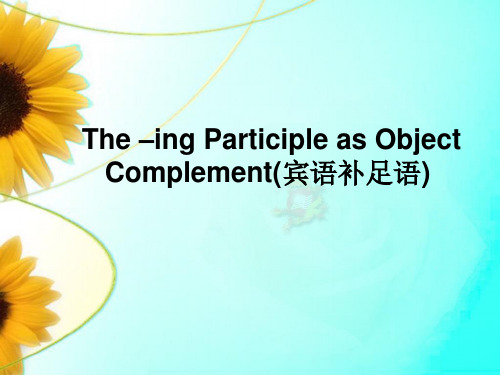
Practice
Fill in blanks:
knocking 1. I heard someone ___________(knock) at the door when I was watching TV. knock 2.Have you heard someone _______(knock) at the door ?
He was heard singing in the next room.
The next morning she found the man ____ in bed, dead.
A. lying
B. lie
C. lay
D. laying
A cook will be immediately fired if he is found ___ in the kitchen. A. smoke B. smoking C. to smoke D.smoked
2.在表示“致使”意义的动词后作宾语补足语。 这类动词有: make (不跟-ing分词作宾补), set, have, get, start, leave, keep, catch
– My father had me writing the whole morning. – He kept me waiting for a long time. – I caught him cheating in the exam. – He was left standing the whole morning. • -ed分词同样可以做“致使”动词的宾补。 – Can I make myself understood? That is a question. – He managed to get it done by himself.
非谓语动词作宾语补足语讲解与练习(修订版)(可编辑修改word版)

非谓语动词作宾语补足语定义:宾语补足语通常是位于宾语之后,说明宾语的状态、特征的成分,多由名词,形容词、副词、不定式,动名词个分词充当.如:The sun keeps us warm.We call her Jenny.They found him out.Make yourself at home.They wish you to go with them.I heard him singing.You must get your hair cut.宾语+宾语补足语=复合宾语,宾语和宾语补足语之间在逻辑上往往有主表、或者主谓的关系.一、动词不定式作宾补。
1.V1 + sb. + to do sth.常用动词有:advise 建议allow 允许ask 叫,请bear 忍受beg 乞求cause 导致command 命令encourage 鼓励expect 期待forbid 禁止force 迫使get 使hate 讨厌help 帮助intend 想要invite 邀请leave 让like 喜欢mean 打算need 需要oblige 迫使order 命令permit 允许persuade 说服prefer 宁愿request 请求remind 提醒teach 教tell 告诉trouble 麻烦want 想要warn 警告wish 希望wait for 等would like 想要would love 想要would prefer 宁愿persuade (劝说)sb to do sth = persuade sb into doing sth温馨提示:1.advise, forbid,allow, permit 这四个词后既可以直接加动名词作宾语,也可以接不定式作宾语补足语,即构成doing sthadvise/ forbid/ allow/ permitsb to do sth2.fear, excuse, refuse, insist, hope, suggest, agree, decide, demand, thank, arrange 等动词后不可接sb to do sth。
宾语补足语
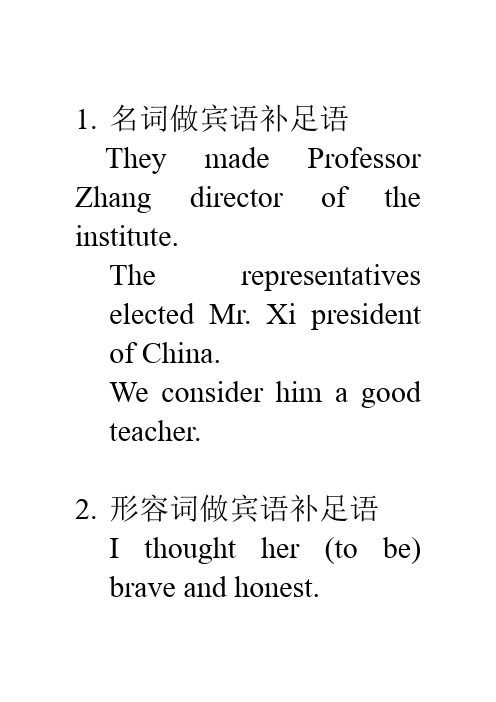
1.名词做宾语补足语They made Professor Zhang director of the institute.The representatives elected Mr. Xi president of China.We consider him a good teacher.2.形容词做宾语补足语I thought her (to be)brave and honest.Your words made her happy.Attaching the message to its leg, he sets the bird loose.4. 介词做宾语补足语We found ourselves in the middle of the desert.3.带to的不定式做宾语补足语.advise, permit, allow, ask, beg, cause, expect, want, force, inspire, encourage, invite, order, remind, warn4.不带to的不定式做宾语补足语(一感二听三让四观看)Feel/hear, listen to/let, make, have/ see, watch, notice, observe变为被动语态时要_________.5.现在分词v-ing做宾语补足语catch sb. doing :抓住某人正在….mind sb. doing : 介意某人做某事imagine sb. doing : 想象某人做某事leave sb./sth. doing : 使得/留下某人….keep sb./sth. doing:使得某人….6.过去分词v-ed做宾语补足语We should keep theminformed of what is going on here.Jane got her bad tooth pulled out at the dentist’s.常见的动宾补结构重点词汇讲解:MakeHaveSee/watchHearLeaveGetSetYour words set me thinking. The servant slipped down and set the dishes flying. The sight of her set his heart beating faster.Set sb. to do sthFindCatchKeepWith +n. +<宾语补足语> The murderer was brought in, with his hands ____ behind his back. (tie) With a lot of difficult problems _____, he is going to have a hard time. (solve) 1. With trees, flowers andgrass_____ everywhere, mynative town hadtaken on a newlook.A. plantingB. plantedC. to plantD .to be planted2. ____ production up by 60%, the company has had another excellent year.A. AsB. ForC. WithD. Through3. ____ everything____ , she left the supermarket with satisfaction.A. As, buyingB. For, to buyC. With, boughtD .Because, to buy1. Though he had often made his little sister ____, today he wasmade ____ by his little sister.A. cry; to cryB. crying; cryingC. cry; cryD. to cry; cry2. They would not allow him _____ across the enemy line.A. to risk goingB. risking to goC. for risk to goD. risk going3. The boy wanted to ride his bicycle in the street, but his mother told him ___.A. not toB. not to doC. not doD. do not to4. When I put my hand on his chest, I could feel his heart still____.A. beatB. to be beatingC. beatingD. was beaten5. You had better get a doctor _____ your bad tooth.A. pull outB. to pull outC. pulled outD. pulling out6. He managedto make himself_____ with his____ English.A. understand; breakingB. understand; brokenC. understood; breakingD. understood; broken7. The doctor asked him not toleave his wound ______(暴露). A. expose B. exposed C. to expose D. exposing8. They are going to have the service man (安装)____ an electric fan in the office tomorrow.A. installB. to installC. to be installedD. installed9. After a few rounds of talks, both sides regarded the territory dispute (领土纠纷) ______.A. being settledB. to be settledC. had settledD. as settled10. You will seethis product ____ wherever you go.A. to be advertisedB. advertisedC. advertiseD. advertising11. His remarks left me _____ about his real purpose.A. wonderedB. wonderC. to wonderD. wondering12. When I caught him ______ me I stopped buying things there and started dealing with another shop.A. cheatingB. cheatC. to cheatD. to be cheating13. Mrs. Brownwas much disappointed to see the washing machine she had had _______went wrong again.A .it B. it repairedC .repaired D. to be repaired 14. She was glad to see her child well_____ care of.A. takeB. to be takenC. takenD. taking15. He found them ____ at a table_____.A. sat; to play chessB. sitting; to play chessC. seated; playing chessD. seat; play thechess16. John rushed out in a hurry, ___ the door_____.A. leaving; unlockedB. leaving; unlockingC. left; unlockedD. to leave; unlocking17. We are pleased to see theproblem___ so quickly.A. settledB. settlingC. be settledD. having been settled18. I could feel the wind ___on my face from an open window.A .to blowB .blowingC. to be blowingD .blown19. Don’t leave the water ____ while you brush your teeth.A. runB. runningC. being runD. to run20. He looked around and caught a man ___ his hand into the pocket of apassenger.A. putB. to be puttingC. to putD. putting21. Laws that punish parents for their little children’s actions against the laws get parents _______.A. worriedB. to worryC.worrying D. worry22. -Good morning. Can I help you? -I'd like to have this package__ ,Madame.A. be weighedB. to be weighedC. to weighD. weighed23. John was made __thetruck for a week as punishment.A .to wash B. washingC. washD. to be washing24. Paul doesn't have to be made __ .He always works hard.A. learnB. to learnC .learned D. learning25. Seeing the sun __ above the surface of the sea, we let out a shout of joy.A. to riseB. to raiseC. risingD .raising26. I was disappointed to find his suggestions________.A. been turneddown B. turned down C. to be turned down D. to turn down27. The patient was warned ____oily food after the operation.A. to eat toB. eating notC .not to eatD not eating28. The speaker raised her voice but still couldn’t make herself _______.A. hearB. hearingC. to hearD. heard29. It’s so cold today, we must keep the fire ________.A. to burnB.burning C. burn D. burnt 30. The mother was asked ________ let her children________ TV every evening.A. not to; watchB. not to; to watchC. not; watchD. not; watching31. They didn’tobserve her _______ in and go upstairs.A. comeB. cameC. to comeD. coming32. I have had my bike_______, and I’m going to have somebody______ __my radio tomorrow.A. repair; to repairB. repairing; to be repairedC. repaired; repairD. to repair; repairing33. Could you show me the mobile phone you’d like ______?A. to haverepaired B. repairing itC. having it repairedD. to repair it34. I can hardly imagine Peter _______ across the Atlantic Ocean in five days.A. sailB. to sailC. sailingD. to have sailed35. ---Have you had anyone ______ your newly-bought flat?---Not yet. I am going to get John _______ a design for it first.A. to decorate; makeB. to decorate; to makeC. decorate;make D. decorate; to make36. Before he came to London, he had never heard a single English word __________.A. speakingB. spokenC. speakD. being spoken37. Is thereanything you want from town? I’m going to get __________.A. those letters mailedB. mailed lettersC. to mail those lettersD. those letters mail 38. The teacher got the students __________ all the words theydidn’t know.A. looked upB. looking inC. to look upD. look at39. When she returned home, she found the window open and something _________A. to stealB. losingC. missedD.stolen40. There was so much noise that the speaker could not make himself_________.A. being heardB. heardC. hearingD. hear41. A cook will be immediately fired if he isfound ___ in the kitchen.A.smokeB.smokingC.to smokeD.smoked42. The boy made his mum very_________.A. angryB. angrylyC. angrilyD. anger43. I feel ____unwise to give a child whatever he or she wants.A. t hatB. howC. itD. what44. When I came back, I found the house _____ and everything_____.A. w as broken; took awayB. broken into; taken awayC. had been broken; takenD. break into; take away45. I heard that you were elected _____ this time.A. monitorB. the monitorC. a monitorD. my monitor46. For a time his grandmother found _____accept his new idea.A. hardB. it hardC. it hard toD. that is hard to 47. The book is said __________ into many foreign languages.A. to have been translatedB. to havetranslatedC. to be translatingD. having been translated48. Do you think it difficult _____ a horse ______ ?A. to train, jumpingB. training, for jumpingC. to train, jumpD. to train, to jump49. My car has broken down. Would you help me__________?A. to get the car to startB. get the car startC. to get the car startedD. get to start the car50. When he andI came in, I found one strange girl ___ in the corner, while he found another strange girl ___ on the sofa.A. seated; satB.seating; sittingC. seated; sittingD. seating; sat。
【精编范文】宾语补足语 - 大学英语语法大全-实用word文档 (1页)
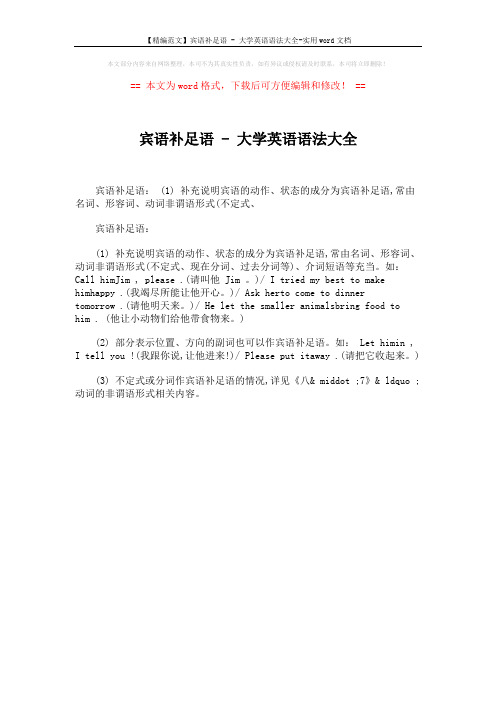
【精编范文】宾语补足语 - 大学英语语法大全-实用word文档
本文部分内容来自网络整理,本司不为其真实性负责,如有异议或侵权请及时联系,本司将立即删除!
== 本文为word格式,下载后可方便编辑和修改! ==
宾语补足语 - 大学英语语法大全
宾语补足语: (1) 补充说明宾语的动作、状态的成分为宾语补足语,常由
名词、形容词、动词非谓语形式(不定式、
宾语补足语:
(1) 补充说明宾语的动作、状态的成分为宾语补足语,常由名词、形容词、动词非谓语形式(不定式、现在分词、过去分词等)、介词短语等充当。
如:
Call himJim , please .(请叫他 Jim 。
)/ I tried my best to make himhappy .(我竭尽所能让他开心。
)/ Ask herto come to dinner
tomorrow .(请他明天来。
)/ He let the smaller animalsbring food to
him . (他让小动物们给他带食物来。
)
(2) 部分表示位置、方向的副词也可以作宾语补足语。
如: Let himin ,
I tell you !(我跟你说,让他进来!)/ Please put itaway .(请把它收起来。
)
(3) 不定式或分词作宾语补足语的情况,详见《八& middot ;7》& ldquo ;动词的非谓语形式相关内容。
宾语补足语
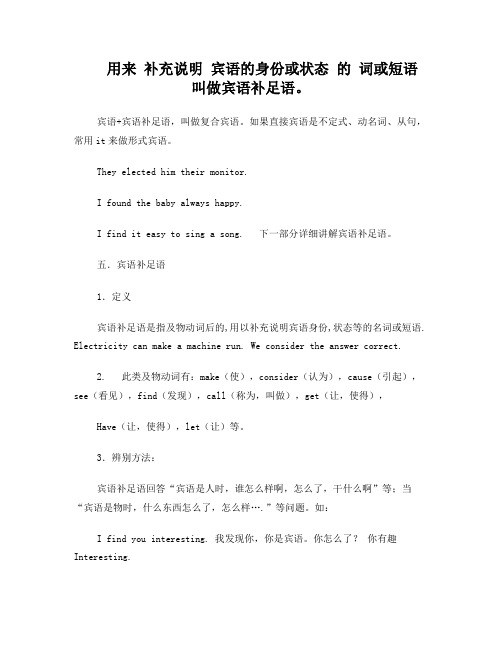
用来补充说明宾语的身份或状态的词或短语叫做宾语补足语。
宾语+宾语补足语,叫做复合宾语。
如果直接宾语是不定式、动名词、从句,常用it来做形式宾语。
They elected him their monitor.I found the baby always happy.I find it easy to sing a song. 下一部分详细讲解宾语补足语。
五.宾语补足语1.定义宾语补足语是指及物动词后的,用以补充说明宾语身份,状态等的名词或短语. Electricity can make a machine run. We consider the answer correct.2. 此类及物动词有:make(使),consider(认为),cause(引起),see(看见),find(发现),call(称为,叫做),get(让,使得),Have(让,使得),let(让)等。
3.辨别方法:宾语补足语回答“宾语是人时,谁怎么样啊,怎么了,干什么啊”等;当“宾语是物时,什么东西怎么了,怎么样….”等问题。
如:I find you interesting. 我发现你,你是宾语。
你怎么了?你有趣Interesting.I saw a book interesting. 我看见一本书,书是宾语。
书怎么样?interesting.4.宾语补足语的构成(1) 名词(包括名词性物主代词):Her father named her Kate.(2) 形容词或形容词短语:They pained their house white.(3) 不定式及其短语:You musn’t force him to lend his money to you.Make, see, have, let, watch, notice, hear, observe等动词后的宾语补足语是不定式时,不加to; help 后的宾补可带也可不带to。
人教版必修二:Unit+4+Section+Ⅲ Grammar——过去分词作定语和宾语补足语+Word版含答案

Section ⅢGrammar——过去分词作定语和宾语补足语过去分词(past participle)是分词的一种。
规则动词的过去分词一般是由动词加-ed构成,不规则动词的过去分词见不规则动词表。
一、过去分词作定语1.意义及物动词的过去分词作定语往往表示被动和完成;不及物动词的过去分词作定语不表示被动,只表示完成。
(1)表示被动和完成a polluted river一条被污染的河流the watered flowers浇过水的花(2)只表示完成,不表示被动fallen leaves落叶the risen sun升起的太阳2.位置单个的过去分词作定语时,通常放在所修饰词的前面;过去分词短语作定语时,通常放在后面,其作用相当于一个定语从句。
A watched pot never boils.[谚语]心急锅不开。
The student dressed in white is my daughter.=The student who is dressed in white is my daughter.穿白色衣服的那个学生是我女儿。
3.现在分词与过去分词作定语的区别现在分词作定语表主动或进行;而过去分词作定语时,表被动或完成。
The car我叔叔的那辆车上周被盗了。
The bridge built in 2013 was designed by a local company.2013年建造的这座大桥是由一家当地公司设计的。
4.难点突破三种非谓语形式作定语所表示的内涵:The meeting昨天开的会很重要。
All the members of the team have attended the meeting being held.所有的队员都出席了正在举行的会议。
It is said that there is a meeting to be held in the hall tomorrow.据说明天这个大厅有个会议要举行。
- 1、下载文档前请自行甄别文档内容的完整性,平台不提供额外的编辑、内容补充、找答案等附加服务。
- 2、"仅部分预览"的文档,不可在线预览部分如存在完整性等问题,可反馈申请退款(可完整预览的文档不适用该条件!)。
- 3、如文档侵犯您的权益,请联系客服反馈,我们会尽快为您处理(人工客服工作时间:9:00-18:30)。
一、宾语补足语的概念某些及物动词的宾语后面还需要有一个补足语,意思才完整,宾语和它的补足语构成复合宾语。
而复合宾语的第一部分通常由名词或代词充当,第二部分表示第一部分的名词或代词发出的动作或身份、特征等,称为宾语补足语。
比如说:I like to keep everything tidy.I'm going to paint it pink.句子中的it显然是宾语。
主语将要做的并不是it,而是paint it pink。
pink 是句子中的宾语补足语。
它和宾语之间是逻辑上的主谓关系,也就是说从逻辑上来讲,是执行了paint的动作。
二、宾语补足语与双宾语的区别宾语补足语是用来补充说明宾语的,双宾语是同等地位的宾语,二者在本质上是不同的。
1,比如pass me the book中,me是间接宾语,指人,也是近宾语;the book是直接宾语,指物,也是远宾语。
又如:They gave him a watch. 这里的him 是间接宾语, a watch 是直接宾语,这种间接宾语和直接宾语同时出现的情况叫双宾语。
常用宾语:常用的能接双宾语的及物动词有:give, teach, buy, lend, find, hand, leave, sell, show, read等。
2,在英语中有些及物动词,接了宾语意义仍不完整,还需要有一个其他的句子成分来补充说明宾语的意义、状态等,称为宾语补足语,简称宾补。
比如说:I heard Jean singing this morning.句子中的Jean显然是宾语。
但是主语I听到的并不是Jean,而是Jean singing。
singing 是句子中的宾语补足语。
它和宾语之间是逻辑上的主谓关系,也就是说从逻辑上来讲,是Jean执行了singing的动作。
句子中的singing是现在分词做宾语补足语。
三、宾语补足语的各种形式能够充当宾补的还有宾语补足语的大致有:不定式,现在分词,过去分词,形容词,副词,介宾短语等。
一般情况下,宾补通常紧跟在宾语之后。
比如:I find learning English difficult.(difficult是形容词做宾补)I saw the kite up and down. (up and down是副词做宾补)Tom made the girl cry. (cry是省略不定式符号to的动词不定式)1,名词或代词宾格+名词They named the baby Jim.We call him Tom.2, 名词或代词宾格+形容词They painted the wall white.I always find her happy and gay(愉快).3,名词或代词宾格+介宾短语People praised(称赞)him as a national hero.The next morning I found him at his machine again.4,名词或代词宾格+动词不定式We asked the teacher to explain the difficult sentences again.The teacher helped him see his error(错误)。
5,名词或代词宾格+分词I heard somebody knocking at the door.He had his ankle sprained while playing football.他踢足球时把脚踝扭伤。
注意:在用现在分词或不定式作宾语补足语的动词中,有些只能用现在分词作宾语补足语;有些只能用不定式作宾语补足语;还有的动词既能用现在分词又可用不定式作宾语补足语:1)、只能用现在分词作宾语补足语的动词有:catch, keep, mind, prevent, stop(阻止)等。
She caught her son smoking a cigarette.His words started me thinking.2)、只能用不定式作宾语补足语的动词有:wish, desire, expect, love, prefer, trust, encourage, let, allow, perm it, mean, lead, bring, put, hurry, cause, remind, ask, invite, beg, request, worry,advise, persuade, call on, tell, order, command, require , make, force, drive, forbid, warn, help, teach, show, assist, report , bear, wait for, think, take, know, judge, consider, suppose, believ e, allow, prove, declare等。
Their parents don’t allow him to stay out late.他父母不允许他在外面呆到很晚。
3)、既能用现在分词又可用不定式作宾语补足语的动词有:see, watch, notice, look at, observe, listen to, hear, feel, have, i magine, discover, like, want, understand, hate, get, set, leave等。
She was seen running away from the scene of the crime. 有人看见她从犯罪现场跑开。
I saw you put the key in your pocket. 我见你把钥匙放进了口袋。
四、什么动词后可有宾语补足语:1. 在表示心理状态的动词后作宾语补足语。
这类动词有:consider, think, believe, discover, find, imagine, judge, suppose, prov e等。
这类动词后的不定式通常是"to be+形容词或名词"结构,think, consider, find后的to be常可省略。
We consider him (to be) a good teacher. 我们认为他是一个好老师。
He proved that theory (to be) very important. 他证明那个理论是很重要的。
I thought her (to be) nice and honest the first time I met her.我第一次见到她的时候就认为她人很好,很诚实。
2. 在表示情感状态的动词后作宾语补足语。
这类动词有:love, like, prefer, hate, want, wish, expect等。
I'd prefer you to leave him alone. 我希望你不要打扰他。
I don't want there to be any trouble. 我不想有任何麻烦。
3. 注意:hope, demand, suggest等动词后面不能接不定式作宾语补足语。
I hope you can give me a hand. 我希望你能帮我一把。
I wish you to give me a hand. 我希望你能帮我一把。
He required us to be present at the meeting. 他要求我们出席会议。
Mr. Li suggested that she should not go there alone. 李先生建议她不要独自去那里。
注意:当感官动词和实意动词,如:See,hear, notice, watch, hear,feel , observe(感官动词),Make,have, let(实意动词),接宾补时,不定式的符号to必须省略。
在help后,不定式可以带to,也可不带。
宾语补足语专项练习一、单项选择:1. The missing boy was last seen ____ near the river.A. playingB. to be playingC. playD. to play2. I feel ____ unwise to give a child whatever he or she wants.A. thatB. howC. itD. what3. It is wise to have some money ____ for old age.A. put awayB. kept upC. given awayD. laid up4. He slipped into the room, without himself ____.A. seenB. being seenC. seeingD. to see5. He found the street much ____.A. crowdB. crowdingC. crowdedD. crowdly6. I think ___ necessary to learn English well.A. itsB. itC. thatD. that is7. Paul doesn’t have to be made ____. He always works hard.A. learnB. to learnC. learnedD. learning8. You can’t have the horse _____ all the way. It’s too hot.A. runB. to runC. runningD. to be running9. When I came back, I found the house _____ and everything _____.A. was broken; took awayB. broken into; taken awayC. had been broken; takenD. break into; take away10. I heard that you were elected _____ this time.A. monitorB. the monitorC. a monitorD. my monitor11. When I came back, I found nobody ___. It was empty.A. onB. outC. inD. away12. The speaker raised his voice but still couldn’t make himself __ ____.A. hearB. to hearC. hearingD. heard13. For a time his grandmother found _____ accept his new idea.A. hardB. it hardC. it hard toD. it is hard to14. Tell him _____ the window.A. to shut notB. not to shutC. to not shutD. not shut15. ----There’s a hole in your bag. ---- I know, I’m going to have it _____.A. mendB. mendingC. mendedD. to be mended16. Though he had often made his little sister ____, today he was made ____ by his little sister.A. cry; to cryB. crying; cryingC. cry; cryD. to cry; cry17. They would not allow him _____ across the enemy line.A. to risk goingB. risking to goC. for risk to goD. risk going18. I found the door _____ when I got home.A. openedB. closeC. unlockingD. open19. The boy wanted to ride his bicycle in the street, but his moth er told him ___.A. not toB. not to doC. not doD. do not to20. I couldn’t do my homework with all that noise____.A. going onB. goes onC. went onD. to go on21. With a lot of difficult problems_____, the newly-elected president ishaving a hard time.A. settledB. settlingC. to settleD. being settled22. I advised _____ at once.A. him to startingB. him to startC. to startingD. to start23. When I put my hand on his chest, I could feel his heart still ____.A. beatB. to be beatingC. beatingD. was beating24. You had better get a doctor _____ your bad tooth.A. pull outB. to pull outC. pulled outD. pulling out25. He managed to make himself____ with his____ English.A. understand; breakingB. understand; brokenC. understood; breakingD. understood; broken二、单句改错:1. The speaker raised his voice but still co uldn’t make himself und erstand2. We all elected Jason the monitor.3. The teacher asked us not make so much noise.4. --- What a nice fire you have in your fireplace!--- During the winter I like my house warmly and comfortable.5. Don’t leave the water run while you brush your teeth.6. He pushed the door opening.7. She looked around and caught a man put his hand into the pocket of a passenger.8. With a lot of difficult problems settle, the newly-elected president is having a hard time.9. When I came in, I found a boy hide behind the door.10. I really don’t know what to do if you always keep your eyes fixing upon me.三、句子翻译:1. 他告诉我要尽快完成作业。
